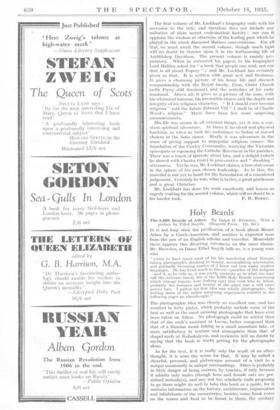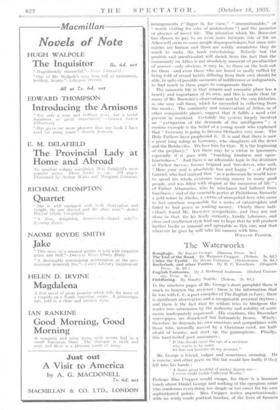Holy Beards
IT is not long since the publication' of a book about Mount Athos by a Greek-American, and another is expected soon from the'pen of an English scholar and traveller. Meanwhile there appears this diverting. intermezzo on the same theme. Mr. Brewster, so Dame Ethel Smyth tells us, is a young man who " seems to have spent most of his life wandering about Europe, taking photographs, drinking in beauty, accumulating adventures, and gradually becoming master of I know not how many modern languages. Ho has lived much in Greece—paradise of the indigent —and if, as he tells us, it was partly curiosity as, to what one may call the intimate family life of the 6,000 Holy Boards (cOncerning which strange reports wore leaking out) that took him to Athos, probably the:romance and beauty of the place was a still more potent lure. I gather his first idea was wholly photographic, the writing down of tho rather surprising experiences retailed in the following pages an afterthought."
The photographic idea was clearly an excellent one, and has resulted in forty plates, which probably include some of the best as well as the most amusing photographs that have ever been taken on Athos. No photograph could be wittier than that of the cook's assistant at Lavra, better composed than that of a Russian monk fishing in a small mountain lake, or more satisfactory in texture and atmosphere than that of chapel roofs at Kafsokalyvia, and reviewers will no doubt be saying that the book is worth getting for the photographs alone.
As for the text, if it is ,really only the result of an after- thought, it is none the worse for that. It may be called a cheerful, personal, and picturesque account of a visit to a unique community in unique surroundings. Athos is probably in little danger of being overrun by tourists, if only because it admits only males (though hens and feMale cats are per- Mitted nowadays), and any not too scholarly, male proposing to go there might do well to take this book as a guide, for it contains information on the history, architecture, organisation and' inhabitants of the monasteries; besides some frank notes on the rooms and food to be found. in ,them, the sanitary _arrangements • (" linger in for =View," " unmentionable," or " worth visiting for sake of architecture ") and the presence or absence of insect life. The attention which Mr. Brewster has chosen to 'pay to an even"Jrxore intimate side of life on Athos Will seem to some people disproport4ate, but since inti- macies are hunian and these are mildly scandalous they do much to make the book entertaining. Nobody but the prudish and uncultivated will shrink from the fact that the community on Athos is not absolutely innocent of peculiarities of moehrs-'—on13,'' obvious, it may be, to those on the Iook-out fbr them—and even those who are bored or easily ruffled by being told of sexual habits differing from their own should be able, in spite of possible moments of indifference or indignation, to find much in these pages to compensate them.
The monastic life in that remote and romantic place has a beauty and importance of its own, and this is made clear by many of Mr. Brewster's observations and by the case histories, as one may call them, which he succeeded in collecting from the monks. The continuity and-conservatism of Athos, as Of other comparable places, suggest that it fulfils a need eiCer present in mankind. Certainly the system largely involves an • " extirpation of the demands of the intelligence " : a curious example is the belief of a young monk who explained that ` Germany is going tobecome Orthodox very soon. The Holy Fathers have prophesied it. It is said that there is now a great king riding in Germany, who slaughters all the Jews and the Bolsheviks. We love him for that. It is the beginning of. the prophecy." Yet there may be a virtue in ignorance, especially if it goes with " touching kindness and open- heartedness." And there is an admirable logic in, the destinies of Father Savvas, former brigand and 'bus-driver, who said, " Here your soul is absolutely free and happy " ; of Father Gabriel, who had realised that ." as a -policeman he would have to- spend his whole: existence causing -misery to many good people, and was filled with disgust at the meanness of life " ; of Father Athanasius, who by mischance had guffered from loneliness ; and of the venerable porter at Philotheou, formerly a gold-miner in .Alaska„ a victim of unrequited love who came to feel somehow responsible for a series of catastrophes and failed to find peace in making' money. Clearly these indi- viduals found Mr. Brewster sympathetic, and they are not alone in that, for his lively curiosity, kindly tolerance, and clear and unaffected style lead one to hope that he will produce further books as unusual and agreeable as this one, and that wherever he goes lie Will take his camera with him.
IrVILLIAM PLOMEE.: •



























































 Previous page
Previous page